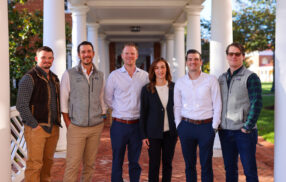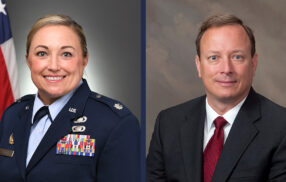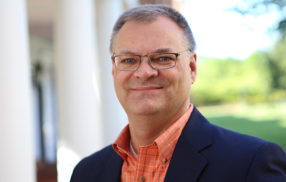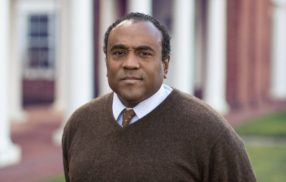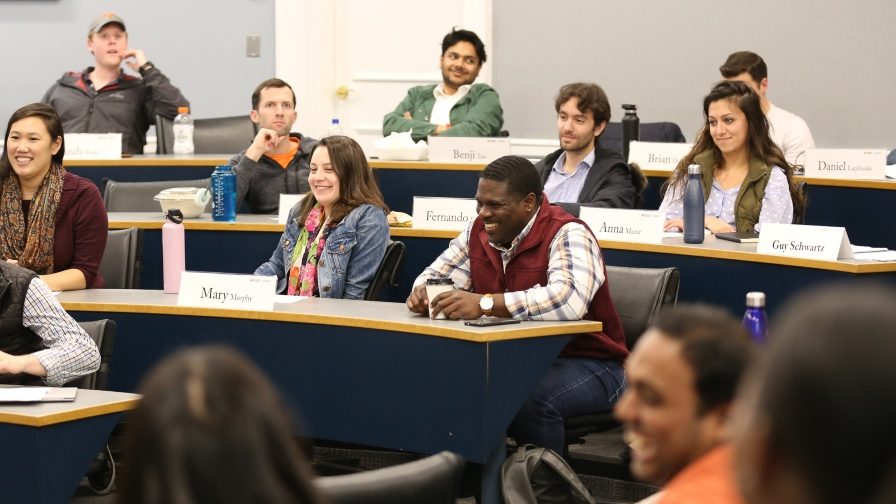
‘Defining Moments’ and Second Chances: Former Prisoner Brings Award-Winning Case to Life
By Dave Hendrick
A University of Virginia Darden School of Business student sits in the front of a classroom, being grilled by dozens of his peers during role-play as a leader facing a crisis in the workplace, in which an employee has been arrested for selling drugs.
Why, Professor Jim Detert and the class want to know, was the employee — a participant in a program placing the formerly incarcerated into the workplace — allowed to work among them without their knowledge of previous criminal history?
“How many other criminals are we working with?” one student wants to know.
“Do you have any felons working with you in senior management?” another asks.
“This incident is an outlier,” the student taking the heat for the program’s supposed failing protests. “These things happen and people make mistakes. I don’t think we need to condemn the whole program because there was one incident.”
“You screwed up and now it sounds like the message to us is, if we don’t like it, we can get out,” says another student.
Eventually, Detert calls an end to the scenario, which is based on one of his cases. The class claps for the effort of the put-upon plant manager, and another student prepares to take a turn in the hot seat during this session of “Defining Moments,” a Second Year elective in the Leadership and Organizational Behavior area that purposefully places students in realistic, high-pressure situations and helps them consider and learn from their responses and reactions. Detert’s “Defining Moments” case and curricular materials in May won the Darden School’s Wells Fargo Award for Excellence in Case Materials.
This final session of “Defining Moments” in the third quarter, before the coronavirus pandemic moved all classes to the virtual realm, was especially powerful because of the day’s guest. Jahaun McKinley, a manager at Cascade Engineering who had joined the company through a prisoner reentry program before steadily climbing its ranks, joined the class to both help lead the intense questioning and share his own journey from incarceration to the working world.
McKinley, who spent the ages from 18 to 37 in prison, asked Darden students to consider the possibility of second chances, noting the legions of people like himself who leave prison wanting nothing more than another opportunity to work hard and to build a life.
Calling Darden students the next generation of leaders in business, McKinley asked them to be aware of people leaving prison in the U.S. every day. They all go somewhere, McKinley said, and choices made by business leaders can help determine whether the formerly incarcerated become productive or unproductive members of society.
“You don’t have to take this as a full takeout meal,” McKinley said of the idea of starting a program to aid the formerly incarcerated in matters of employment. “Just be willing to taste it.”
Asked to describe the business case for supporting a program like the Returning Citizens initiative sponsored by Cascade, McKinley said he suspected he came in at a lower salary than someone without a criminal record, but more importantly, his drive was unparalleled. When a company like Cascade took a chance on him, it instilled extreme loyalty toward the company, said McKinley, who was promoted to supervisor and then lean manufacturing manager in short succession at Cascade.
“I will work you under the table because I understand what the risk is,” McKinley said. “That’s the business case.”
Another important factor supporting second chance programs like Cascade’s: The company is widely celebrated as a great place to work, is an employer of choice, has extremely committed and productive employees, and very low turnover.
Regarding his own new beginning at Cascade, McKinley recounted a few awkward conversations with new coworkers initially, but said any concerns were soon forgotten as people began to work by his side and see the person he is. “We are the same people, we just have a different history,” McKinley said. “I want the same things you want, I guarantee it. We just have a different starting point in our journey.”
Wrapping the class, Detert, who also serves as associate dean for executive degree programs and leadership initiatives at Darden, reminded students that courage, including the kind shown by leaders at companies such as Cascade Engineering, involves “being willing to take risks for something important.”
Detert paraphrased writer George Bernard Shaw’s statement that while reasonable people adapt themselves to the world, unreasonable people try to adapt the world to themselves, and that’s why all progress depends on unreasonable people. “Thus,” Detert encouraged the class, “if you want the world to be different, you’re going to have to be willing to be a little bit unreasonable.”
The University of Virginia Darden School of Business prepares responsible global leaders through unparalleled transformational learning experiences. Darden’s graduate degree programs (MBA, MSBA and Ph.D.) and Executive Education & Lifelong Learning programs offered by the Darden School Foundation set the stage for a lifetime of career advancement and impact. Darden’s top-ranked faculty, renowned for teaching excellence, inspires and shapes modern business leadership worldwide through research, thought leadership and business publishing. Darden has Grounds in Charlottesville, Virginia, and the Washington, D.C., area and a global community that includes 18,000 alumni in 90 countries. Darden was established in 1955 at the University of Virginia, a top public university founded by Thomas Jefferson in 1819 in Charlottesville, Virginia.
Press Contact
Molly Mitchell
Senior Associate Director, Editorial and Media Relations
Darden School of Business
University of Virginia
MitchellM@darden.virginia.edu



